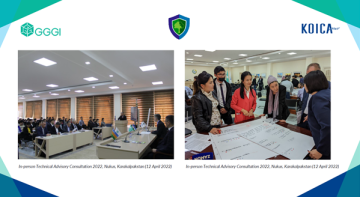
Nukus, 12 April 2022 – The Global Green Growth Institute (GGGI) in Uzbekistan hosted four days of in-person Technical Advisory Consultation Sessions for the 'Green Rehabilitation Investment Project for Karakalpakstan Republic to address impacts of the Aral Sea crisis' with key stakeholders in Nukus and 4 districts.
The high-level consultation event in Nukus included 47 stakeholders from the Council of Ministers of the Republic of Karakalpakstan, key ministries and departments, heads of districts, and non-governmental organisations. The meetings conducted in the project districts of Bozatau, Chimbay, Karauzyak and Kegeyli involved a total of 109 khokimiyat and mahalla representatives, agricultural specialists and farmers, youth, and women representatives.
This consultation sought stakeholder and beneficiary inputs to ground-truth and validate preliminary analyses and address existing information/data gaps. These events incorporated a combination of workshop and focus group discussions and shared four key project deliverables under development: the Climate Resilience Green Growth (CRGG) assessment, the Green Recovery Investment Analysis (GRIA), the Risk Profile on Disaster-Related Human Security, and the Risk Mitigation Capacity Building Curriculum Outline.
The Climate Resilience Green Growth (CRGG) assessment presents a cross-cutting analysis of the agriculture sector of Uzbekistan and Karakalpakstan by assessing the exposure, sensitivity, and adaptive capacity of the agricultural sector to both climate change and the Aral Sea dust impacts. Drawing upon a consultative process, the CRGG expects to contribute to the identification and prioritization of a realistic and effective green investment project pipeline.
Drawing on GGGI’s detailed 1,200 household survey in 4 target districts, the Green Recovery Investment Analysis (GRIA) analyses the potential impact of investments in three adaptation measures for farm protection: drip-irrigation systems and planting windbreaks for fruit orchards, greenhouses for vegetables. The GRIA provides a scenario-based assessment of monetary and non-monetary benefits that may be realized under the current levels of investment, contrasted with the impacts of meeting the government's targets for dissemination of these technologies, as well as potential for further scaling according to GGGI’s landscape-wide potential suitability analysis.
In addition, GGGI presented an overview of two deliverables aimed at diagnosing and supporting development needs for women, youth, and male farming stakeholders in 4 target districts of Karakalpakstan. The risk profile for disaster-related human security will assess threats to livelihoods and health, perceptions of environmental degradation and climate change and feed into the identification of priority capacity development needs. Based on this risk assessment, integrated risk-reduction and climate-resilient agriculture capacity-building programs will be implemented to enhance the skills of youth, women, and men in the 4 target districts.
The Aral Sea GRIP is co-financed by the Korea International Cooperation Agency (KOICA) and GGGI and has a 3-year duration (2021-2024).
